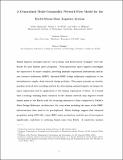| dc.contributor.author | Ishimatsu, Takuto | |
| dc.contributor.author | de Weck, Olivier L. | |
| dc.contributor.author | Hoffman, Jeffrey A. | |
| dc.contributor.author | Ohkami, Yoshiaki | |
| dc.contributor.author | Shishko, Robert | |
| dc.date.accessioned | 2015-10-19T12:51:41Z | |
| dc.date.available | 2015-10-19T12:51:41Z | |
| dc.date.issued | 2015-10-19 | |
| dc.identifier.issn | 0022-4650 | |
| dc.identifier.issn | 1533-6794 | |
| dc.identifier.uri | http://hdl.handle.net/1721.1/99360 | |
| dc.description.abstract | Simple logistics strategies such as "carry-along" and Earth-based "resupply" were sufficient for past human space programs. Next-generation space logistics paradigms are expected to be more complex, involving multiple exploration destinations and in-situ resource utilization (ISRU). Optional ISRU brings additional complexity to the interplanetary supply chain network design problem. This paper presents an interdependent network flow modeling method for determining optimal logistics strategies for space exploration and its application to the human exploration of Mars. It is found that a strategy utilizing lunar resources in the cislunar network may improve overall launch mass to low Earth orbit for recurring missions to Mars compared to NASA’s Mars Design Reference Architecture 5.0, even when including the mass of the ISRU infrastructures that need to be pre-deployed. Other findings suggest that chemical propulsion using LOX/LH[subscript 2], lunar ISRU water production, and the use of aerocapture significantly contribute to reducing launch mass from Earth. A sensitivity analysis of ISRU reveals that under the given assumptions, local lunar resources become attractive at productivity levels above 1.8 kg/year/kg in the context of future human exploration of Mars. | en_US |
| dc.description.sponsorship | Jet Propulsion Laboratory (U.S.). Strategic University Research Partnerships Program | en_US |
| dc.language.iso | en_US | |
| dc.publisher | American Institute of Aeronautics and Astronautics | en_US |
| dc.rights | Creative Commons Attribution-Noncommercial-Share Alike | en_US |
| dc.rights.uri | http://creativecommons.org/licenses/by-nc-sa/4.0/ | en_US |
| dc.source | MIT web domain | en_US |
| dc.title | A Generalized Multi-Commodity Network Flow Model for the Earth-Moon-Mars Logistics System | en_US |
| dc.type | Article | en_US |
| dc.identifier.citation | Ishimatsu, Takuto, Olivier L. de Weck, Jeffrey A. Hoffman, Yoshiaki Ohkami, and Robert Shishko. "A Generalized Multi-Commodity Network Flow Model for the Earth-Moon-Mars Logistics System." Forthcoming in the Journal of Spacecraft and Rockets | en_US |
| dc.contributor.department | MIT Institute for Data, Systems, and Society | en_US |
| dc.contributor.department | Massachusetts Institute of Technology. Department of Aeronautics and Astronautics | en_US |
| dc.contributor.department | Massachusetts Institute of Technology. Engineering Systems Division | en_US |
| dc.contributor.mitauthor | Ishimatsu, Takuto | en_US |
| dc.contributor.mitauthor | de Weck, Olivier L. | en_US |
| dc.contributor.mitauthor | Hoffman, Jeffrey A. | en_US |
| dc.relation.journal | forthcoming in the Journal of Spacecraft and Rockets | en_US |
| dc.eprint.version | Author's final manuscript | en_US |
| dc.type.uri | http://purl.org/eprint/type/JournalArticle | en_US |
| eprint.status | http://purl.org/eprint/status/PeerReviewed | en_US |
| dspace.orderedauthors | Ishimatsu, Takuto; de Weck, Olivier L.; Hoffman, Jeffrey A.; Ohkami, Yoshiaki; Shishko, Robert | en_US |
| dc.identifier.orcid | https://orcid.org/0000-0001-6677-383X | |
| dc.identifier.orcid | https://orcid.org/0000-0002-7543-6920 | |
| mit.license | OPEN_ACCESS_POLICY | en_US |
| mit.metadata.status | Complete | |
